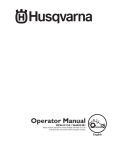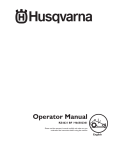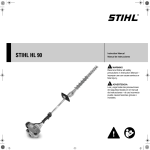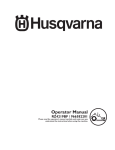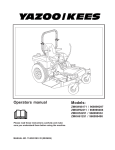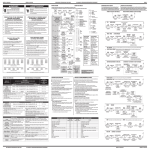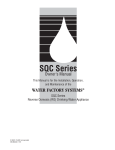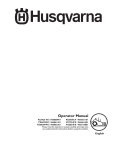Download Husqvarna WH3616 User's Manual
Transcript
Operator Manual WH3616 / 966638601 WH4818 / 966638602 WH5218 / 966638603 Please read the operator’s manual carefully and make sure you understand the instructions before using the machine. English In order to implement improvements, specifications and designs can be altered without prior notification. Note that no legal demands can be placed based on the information contained in these instructions. Use only original parts for repairs. The use of other parts voids the warranty. Do not modify or install non-standard equipment to the unit without consent from the manufacturer. Modifications to the unit may cause unsafe operations or damage the unit. ©2010 All rights reserved. Orangeburg, SC Printed in U.S.A. Contents INTRODUCTION................................................................ 5 General........................................................................ 5 Driving and Transport on Public Roads....................... 5 Operating..................................................................... 5 Good Service............................................................... 6 Symbols and Decals................................................... 7 General Operation....................................................... 8 Personal Safety Equipment......................................... 9 Slope Operation........................................................... 9 Safe Handling of Gasoline......................................... 11 General Maintenance................................................ 12 Transport.................................................................... 13 Controls...................................................................... 14 Control Locations....................................................... 14 Recoil Starter Grip..................................................... 15 Ignition Switch........................................................... 15 Drive Levers............................................................... 15 Operator Presence Levers........................................ 16 Ground Speed Control.............................................. 16 Choke Control............................................................ 16 Throttle Control.......................................................... 17 Neutral Lock.............................................................. 17 Tracking Adjustment.................................................. 17 Parking Brake............................................................ 18 Blade Engagement Control....................................... 18 Service Meter............................................................. 18 Fuel Shut-off Valve..................................................... 19 Fuel Tank.................................................................... 19 Operation..................................................................... 20 Before Starting........................................................... 20 Starting the Engine.................................................... 21 Running..................................................................... 23 Reverse...................................................................... 23 Tracking Adjustment.................................................. 23 Operating on Hills...................................................... 23 Mowing Tips.............................................................. 24 Transport.................................................................... 25 Stopping.................................................................... 25 Emergency Stop.............................................. 25 Stopping the Engine........................................ 25 Cutting Height Adjustment........................................ 27 Cutting Height Table.................................................. 28 Maintenance................................................................ 29 Maintenance Schedule.............................................. 29 Safety System............................................................ 31 Function Check................................................ 31 Tire Pressures............................................................ 32 Deck Belt................................................................... 32 Cutting Blades........................................................... 33 Cleaning.................................................................... 34 Hardware................................................................... 34 LUBRICATION.................................................................. 36 Front Wheel Mount..................................................... 36 Front Wheel Bearings................................................ 36 TROUBLESHOOTING...................................................... 37 Winter Storage........................................................... 39 STORAGE........................................................................ 39 Service....................................................................... 39 schematics................................................................... 40 Lower Harness.......................................................... 40 Harness Adapter....................................................... 40 Upper Harness.......................................................... 41 TECHNICAL DATA........................................................... 42 CONFORMITY CERTIFICATES......................................... 45 SERVICE JOURNAL......................................................... 46 WARNING! Failure to follow cautious operating practices can result in serious injury to the operator or other persons. The owner must understand these instructions, and must allow only trained persons who understand these instructions to operate the mower. Each person operating the mower must be of sound mind and body and must not be under the influence of any mind altering substance. WARNING! Engine exhaust, some of its constituents, and certain vehicle components contain or emit chemicals known to the State of California to cause cancer and birth defects or other reproductive harm. INTRODUCTION Congratulations Operating Thank you for purchasing a Husqvarna Walk-Behind mower. This machine is built for superior efficiency to rapidly mow primarily large areas. A control panel easily accessible to the operator and a transmission regulated by steering controls both contribute to the machine’s performance. This manual is a valuable document. Read the contents carefully before using or servicing the machine. Following the instructions (use, service, maintenance) is important for the safety of the operator and others. It can also considerably increase the life span of the machine and increase its resale value. If the machine is sold, the operator’s manual should be provided to the new owner. The final chapter of this operator’s manual provides a Service Journal. Ensure that service and repair work are documented. A well-kept service journal reduces service costs for the maintenance and affects the machine’s resale value. Provide the dealer with the operator’s manual when the machine is taken for service. This machine is constructed only for mowing grass on lawns and even ground without obstacles such as stones or tree stumps. The machine can also be used for other tasks when equipped with special accessories provided by the manufacturer. Operating instructions for the accessories are provided with delivery. All other types of uses are incorrect. The manufacturer’s directions concerning operation, maintenance, and repairs must be carefully followed. Lawn mowers and all power equipment, can be potentially dangerous if used improperly. Safety requires good judgement, careful use in accordance with these instructions and common sense. The machine must only be operated, maintained, and repaired by persons familiar with the machine’s special characteristics and who are also knowledgeable about the safety instructions. Use only approved repair parts to maintain this machine. Accident prevention regulations, other general safety regulations, occupational safety rules, and traffic regulations must be followed without fail. Unauthorized modifications to the design of the machine may absolve the manufacturer from liability for any resulting personal injury or property damage. General In this operator’s manual, left and right, backward and forward are used in relation to the machine’s normal driving direction. Continuous dedication to improve our products require that specifications and design are subject to change without notice. Driving and Transport on Public Roads Check applicable road traffic regulations before transporting on public roads. If the machine is transported, you must always use approved fastening equipment and ensure that the machine is well anchored. DO NOT operate this machine on public roadways. 5 INTRODUCTION Good Service Husqvarna’s products are sold throughout the world and only in specialized retail stores with complete service. This ensures that you as a customer receive only the best support and service. Before the product is delivered, the machine has, for example, been inspected and adjusted by your retailer. See the This manual belongs to the machine with the manufacturing number: Manufacturing Number The machine’s manufacturing number can be found on the printed plate affixed to the left in the engine compartment. Stated on the plate, from the top are: • The machine’s type designation (I.D.). • The manufacturer’s type number (Model). • The machine’s serial number (Serial no.) Please have the type designation and serial number available when ordering spare parts. The engine’s manufacturing number is stamped on a barcode decal. The decal is placed on the left side of the crankcase. The plate states: • The engine’s serial number (E/NO). • The engine’s type designation (Code) Please have these available when ordering spare parts. 6 certificate in the Service Journal in this operator’s manual. When you need spare parts or support in service questions, warranty issues, etc., please consult the following professional: Engine Transmission symbols and decals These symbols are found on the machine and in the operator’s manual. Study them carefully so that you know what they mean. WARNING! Xxxx xxxxxx xxxxx xxxx xxxxxxxxx xxxxxx xxxxxxxxx. xx xxxxxxxx xxxx xxxxxx. Used in this publication to notify the reader of a risk of personal injury or death, particularly if the reader should neglect to follow instructions given in the manual. Moving sharp blades under cover IMPORTANT INFORMATION Xxxx xxxxxx xxxxx xxxx xxxxxxxxx xxxxxx xxxxxxxxx. xx xxxxxxxx xxxx xxxxxx. Used in this publication to notify the reader of a risk of material damage, particularly if the reader should neglect to follow instructions given in the manual. Used also when there is a potential for misuse or misassembly. Use protective glasses Warning! Rotating blades, keep away from the discharge deck Use protective gloves Do not touch rotating parts 7 SAFETY These instructions are for your safety. Read them carefully. General Operation • • • • • • • • • • • • • • • 8 Read, understand, and follow all instructions on the machine and in the manual before starting. Do not put hands or feet near rotating parts or under the machine. Keep clear of the discharge opening at all times. Clear the area of objects such as rocks, toys and wire, which could be picked up and thrown by the blades. Be sure the area is clear of bystanders before operating. Stop machine if anyone enters the area. Always look down and behind during reverse maneuvers. Look for both large and small obstacles. Never direct discharged material toward anyone. Avoid discharging material against a wall or obstruction. Material may ricochet back toward the operator. Stop the blades when crossing gravel surfaces. Do not operate machine without the entire grass catcher, discharge guard, or other safety devices in place and working Slow down before turning. Never leave a running machine unattended. Disengage blades when not mowing. Shut off engine and wait for all parts to come to a complete stop before cleaning the machine, removing the grass catcher, or unclogging the discharge chute. Operate machine only in daylight or good artificial light. Do not operate the machine while under the influence of alcohol or drugs. Only allow responsible adults, who are familiar with the instructions, to operate the machine. Never take passengers. The machine is only intended for use by one person. Use extra care when loading or unloading the machine into a trailer or truck. 8011-632 Never take passengers WARNING! Engine exhaust and certain vehicle components contain or emit chemicals considered to cause cancer, birth defects, or other reproductive system damage. The engine exhaust contains carbon monoxide, which is a odorless, colorless, poisonous gas. Do not use the machine in enclosed spaces. SAFETY Personal Safety Equipment WARNING! When using the machine, approved personal protective equipment (shown in illustrations) shall be used. Personal protective equipment cannot eliminate the risk of injury but it will reduce the degree of injury if an accident does happen. Ask your retailer for help in choosing the right equipment. • • • • • • Make sure first aid equipment is close at hand when using the machine. Never use the machine when barefoot. Always wear protective shoes or boots, preferably with steel toe caps. Always wear approved protective glasses or a full visor when assembling or driving. Always wear gloves when handling the blades. Never wear loose clothing that can get caught in moving parts. Use ear protectors to avoid damage to hearing. Slope Operation Slopes are a major factor related to loss of control or machine tip-over accidents, which can result in severe injury or death. Operation on all slopes requires extra caution. If you cannot reverse up the slope or if you feel unsure, do not mow it. • Mow across slopes (10 degrees maximum), not up and down. • Watch for holes, ruts, bumps, rocks, or other hidden objects. Uneven terrain could overturn the machine. Tall grass can hide obstacles. • Choose a low ground speed so that you will not have to stop while on the slope. • Do not mow on wet grass. Tires may lose traction. • Avoid starting, stopping, or turning on a slope. If the tires lose traction, disengage the blades and proceed slowly straight down the slope. • Keep all movement on the slopes slow and gradual. Do not make sudden changes in speed or direction, which could cause the machine to roll over. • Use extra care while operating machine with grass catchers or other attachments; they can affect the stability of the machine. • Do not use on steep slopes. • Do not mow near drop-offs, ditches, or embankments. The machine could suddenly roll over if a wheel is over the edge or if the edge caves in. 8011-670 Personal protective equipment 8062-043 Mow side to side, not up and down3 WARNING! Never use the machine on terrain that slopes more than 10 degrees. Mow slopes side to side, not up and down. Avoid sudden directional changes. 9 SAFETY Children Tragic accidents can occur if the operator is not alert to the presence of children. Children are often attracted to the machine and the mowing activity. Never assume that children will remain where you last saw them. • Keep children out of the mowing area and in the watchful care of a responsible adult other than the operator. • Be alert and turn machine off if a child enters the area. 8011-633 Keep children away from the work area • • • • Before and while backing, look behind and down for small children. Never carry children, even with the blades shut off. They may fall off and be seriously injured or interfere with safe machine operation. Never allow children to operate the machine. Use extra care when approaching blind corners, shrubs, trees, or other objects that may block your view of a child. 8011-636 Never allow children to operate the machine 10 SAFETY Safe Handling of Gasoline To avoid personal injury or property damage, use extreme care in handling gasoline. Gasoline is extremely flammable and the vapors are explosive. • Extinguish all cigarettes, cigars, pipes, and other sources of ignition. • Use only approved gasoline container. • Never remove gas cap or add fuel with the engine running. Allow engine to cool at least two (2) minutes before refueling. • Never fuel the machine indoors. • Never store the machine or fuel container where there is an open flame, spark, or pilot light such as on a water heater or other appliance. • Before you begin refueling, minimize the risk of static electricity by touching a metal surface. • Never fill containers inside a vehicle or on a truck or trailer bed with plastic liner. Always place containers on the ground away from the vehicle when filling. • Remove gas-powered equipment from the truck or trailer and refuel it on the ground. If this is not possible, refuel such equipment with a portable container, rather than from a gasoline dispenser nozzle. • Keep the nozzle in contact with the rim of the fuel tank or container opening at all times until fueling is complete. Do not use a nozzle lock-open device. • If fuel is spilled on clothing, change clothing immediately. • Never overfill fuel tank. Replace gas cap and tighten securely. • Do not start the engine near spilled fuel. • Never use gasoline as a cleaning agent. • If leaks arise in fuel system, engine must not be started until problem has been resolved. • Check the fuel level before each use and leave space for the fuel to expand, as the heat from the engine and the sun may otherwise cause the fuel to expand and overflow. 8011-637 Never fill the fuel tank indoors WARNING! The engine and the exhaust system become very hot during operation. There is risk for burns if touched. Allow engine and exhaust system to cool to a safe temperature before refueling. 8011-777 Do not smoke when using the machine 11 SAFETY General Maintenance • • • • • • • • • • • • • • • • • 12 Never operate machine in a closed area. Keep all nuts and bolts tight to be sure the equipment is in safe working condition. Never tamper with safety devices. Check their proper operation regularly. Keep machine free of grass, leaves, or other debris buildup. Clean oil or fuel spillage and remove any fuel-soaked debris. Allow machine to cool before storing. If you strike a foreign object, stop and inspect the machine. Repair, if necessary, before restarting. Never make any adjustments or repairs with the engine running. Check grass catcher components and the discharge guard frequently and replace with manufacturer’s recommended parts, when necessary. Mower blades are sharp. Wrap the blade or wear gloves, and use extra caution when servicing them. Check brake operation frequently. Adjust and service as required. Maintain or replace safety and instruction labels, as necessary. Do not modify safety equipment. Check regularly to be sure it works properly. The machine must not be used with defective or unmounted protective plates, protective cowlings, safety switches, or other protective devices. Do not change the settings of governors and avoid running the engine with overly high engine speeds. If you run the engine too fast, you risk damaging the machine components. Use protective goggles. Ensure that the fuel filler cap is mounted tightly and no flammable substances are stored in an open vessel. Never use the machine indoors or in spaces lacking proper ventilation. The exhaust fumes contain carbon monoxide, an odorless, poisonous, and lethal gas. Stop and inspect the equipment if you run over or into anything. If necessary, make repairs before starting. The machine is tested and approved only with the equipment originally provided or recommended by the manufacturer. Only use approved repair parts for the machine. Never operate the machine in an enclosed space 8011-638 WARNING! Use protective glasses for maintenance work. WARNING! The engine must not be started when the protective plate for the mower deck’s drive belt is removed. SAFETY • • • The mulch blades should only be used in familiar areas when higher quality mowing is desired. Reduce the risk of fire by removing grass, leaves, and other debris that may have accumulated on the machine. Allow the machine to cool before putting it in storage. Regularly clean deck and underside of deck, avoid spraying engine and electrical components with water. Transport • • • The machine is heavy and can cause serious crushing injuries. Be extra cautious when it is loaded on or unloaded from a vehicle or trailer. Use an approved trailer to transport the machine. Activate the parking brake, turn off the fuel supply, and fasten the machine with approved fastening devices, such as bands, chains, or straps, when transporting. Check and abide by local traffic regulations before transporting the machine on any road. Clean the machine regularly 8011-639 13 CONTROLS This operator’s manual describes the Husqvarna Walk-Behind Mower. The machine is fitted with a Kawasaki four-stroke overhead valve engine. Using the left and right drive levers, the speed of the rear wheels is regulated for steering the machine. Control Locations 13 12 11 9 10 8 7 6 5 4 3 1 2 8062-021 1. Fuel Cap/Tank 2. Throttle Control 3. Choke Control 4. Ground Speed Control 5. Blade Engagement Control 6. Hour Meter (optional) 7. Ignition Switch 14 8. 9. 10. 11. 12. 13. Operator Presence Switch Drive Lever Neutral Lock Recoil Starter Grip Parking Brake Fuel Shutoff CONTROLS Recoil Starter Grip IMPORTANT INFORMATION Do not let recoil cord snap back by itself. This may damage the cord or the recoil starter assembly. Pull the recoil starter grip slowly until you feel compression, then pull it briskly. Normally this engine will not backfire. If you get backfires, contact your Husqvarna dealer for service. 8062-006 Recoil starter grip Ignition Switch The ignition key switch is located on the control panel at the lower right. 8062-003 Ignition key Drive Levers The machine’s speed and direction are continuously variable using the two motion control levers. By releasing both controls an equal amount the machine moves in a straight line forward. In order, for example, to turn right while moving forward, squeeze the right control upward toward the handle (neutral position). The rotation of the right wheel is reduced and the machine turns to the right. To stop forward travel, pull both drive levers up into the neutral position. When both controls are in the neutral position, the machine stands still. The controls will be locked in neutral position when both neutral locks are engaged. 8062-044 Drive lever - left hand 15 CONTROLS Operator Presence Switches Located on the handle, the Operator Presence System levers serve as an additional safety feature. An electrical interlock safety system is activated by depressing either one or both of the Operator Presence Levers at the handle grips. Releasing both Operators Presence Levers while mowing or transporting will break the electrical circuit and cause the engine and mower to stop. The mower will not stop immediately after releasing the OP levers and some travel occurs. When either the blades or the speed control are engaged, one or both levers must be pressed for the engine to remain running. 8062-044 Operator presence lever - left hand Ground Speed Control Ground speed is adjusted with the center lever on the control panel. Ease the lever out of the start position and upwards to the desired speed. 8062-003 Ground speed control Choke Control The choke control is used for cold starts to provide the engine with a richer fuel mixture. To engage the control, pull the choke out to its extent. Do not use the choke when starting a warm engine. 8062-003 Choke control 16 CONTROLS Throttle Control The throttle control regulates the engine speed and thereby the rate of rotation of the blades, assuming the blade engagement control is engaged (pulled up). In order to increase or decrease the engine speed, the control is moved forward or backward respectively. Avoid idling the engine for long periods, as there is a risk of the spark plugs fouling. For best mower performance, USE FULL THROTTLE WHEN MOWING. 8062-003 Throttle control Neutral Lock Located on top the motion controls, the neutral locks keep the unit from moving while idling. The locks should be activated when starting the engine. To disengage the locks, squeeze slightly upward on the driver levers and using thumbs, slide the neutral locks back. IMPORTANT INFORMATION Be sure neutral locks are either fully forward (locked) or fully back (unlocked). If the neutral lock is between full forward and full back, the machine will not track properly. 8062-044 Neutral Lock - left hand Tracking Adjustment If the mower is not tracking straight, check the air pressure in both rear tires. Recommended air pressure is 15 psi (1 bar). Tracking should be checked on a flat, level surface. Loosen the lock knob (1). Turn the tracking knob (2) clockwise to adjust the mower to the left. Turn the knob counter-clockwise to adjust the mower to the right. 2 1 8062-027 Tracking knob 17 CONTROLS Parking Brake The parking brake is located behind the right hand tire and is applied by pressing the pedal downwards. To disengage the parking brake, push down and pivot the pedal to the rear. 8062-005 Parking brake Blade Engagement Control The blade engagement control is on the center control panel. In order to engage the blades, pull the control upwards. The blades are disengaged when the lever is pushed down. WARNING! Gasoline is highly flammable. Observe caution and fill the tank outdoors (see the safety instruction). 8062-003 Blade control Service Meter Optional The optional service meter displays the total operating time. The meter will flash CHG OIL (Change Oil) at 50 hour intervals. The flash duration is one hour before and one hour after the interval. The CHG OIL icon will come on and shut off automatically. The hour meter cannot be manually reset. 8062-003 Service meter 18 CONTROLS Fuel Shutoff Valve The fuel shutoff valve is placed on the fuel line below the fuel tank. The valve is on when the turn lever is parallel to the fuel line. The OFF position will have the turn lever running perpendicular to the fuel line. See illustration. WARNING! Fill to bottom of filler neck. Do not overfill. Wipe off any spilled oil or fuel. Do not store, spill or use gasoline near an open flame. 8062-007 Fuel shutoff valve - closed (OFF) Fuel Tank The machine has one fuel tank. The tank volume is 6 gallons / 22.7 liters. The engine should run on a minimum of 87-octane unleaded gasoline (no oil mix). Also see Technical Data concerning methanol and ethanol fuels. When operating in temperatures below 32° F. (0° C.), use fresh, clean winter grade gasoline to help insure good cold weather starting. IMPORTANT INFORMATION Experience indicates that alcohol blended fuels (called gasohol, ethanol or methanol) can attract moisture which leads to separation and formation of acids during storage. Acidic gas can damage the fuel system of an engine while in storage. To avoid engine problems, the fuel system should be emptied before storage of 30 days or longer. Drain the gas tank, start the engine and let it run until the fuel lines and carburetor are empty. Use fresh fuel the next season. See Storage Instructions for additional information. Never use engine or carburetor cleaners in the fuel tank or permanent damage may occur. 8062-003 Fuel cap WARNING! The engine and the exhaust system, become very hot during operation. Risk for burns if touched. Allow engine and exhaust system to cool at least two (2) minutes before refueling 19 operation Before Starting WARNING! Be thoroughly familiar with control operation and function before using the mower. • Read the sections on Safety and Controls before starting the machine. • Perform the daily maintenance before starting (see Maintenance Schedule). • Check that there is sufficient fuel in the fuel tank. The following conditions must be fulfilled before the engine can be started: • The control for engaging the blades must be in disengaged (down) position. • The speed control lever must be in the start position. 8062-010 Starting position WARNING! Do not operate the mower if the interlock safety system allows operation or starting in any unsafe condition. 8062-039 Neutral lock 20 operation Starting the Engine Open fuel shut-off valve. 8062-040 Fuel shutoff valve - open Turn ignition key to ON position. 8062-003 Ignition key Set throttle control at the lowest position and engage the choke (if needed). Do not use choke when the engine is warm. 8062-010 Set throttle control 21 operation WARNING! Do not run the engine indoors, in enclosed or poorly ventilated spaces. Engine exhaust fumes contain poisonous carbon monoxide. Confirm that the speed control lever is in the start position. IMPORTANT INFORMATION Do not let the recoil cord snap back by itself. This may damage the cord or the recoil starter assembly. 8062-009 Speed control in the start position Pull the recoil starter grip slowly until you feel compression, then pull briskly. If the engine won’t start in three pulls, open the choke and try again. Warm engine momentarily, then disengage the choke until engine runs smoothly. 8062-006 Recoil starter grip Release the parking brake by pivoting the pedal back and downwards until it clears the brake shaft. 8062-005 Parking brake 22 operation Running Depress one operator presence lever and move the speed control to the desired speed. Pull the blade engagement control upwards. Set the desired rpm with the throttle. The best cutting and bagging is obtained with engine at top rpm. While on level terrain, squeeze both drive levers slightly. Using thumbs, slide each neutral lock out the locked position. Slowly release both drive levers at the same time to begin forward motion. The steering system of this mower uses individual right and left drive levers on the handle bars. Squeezing either lever will reduce the speed to that wheel. With the opposite wheel still under power, a turn is accomplished. If the drive lever is squeezed even tighter the wheel will go into reverse and a tighter more abrupt turn is accomplished. Turn left by squeezing the left hand lever or turn right by squeezing the right hand lever. 8062-044 Operator presence lever - left hand WARNING! Be sure all persons are clear of area before engaging the blades. Reverse The mower moves to the reverse gear when both drive levers are pulled fully upward to the handles. Tracking If the mower is not tracking straight, check the air pressure in both rear tires. Recommended air pressure is 15 psi (1 bar). Tracking should be checked on a flat, level surface. See Tracking Adjustment in the Controls section. 8062-027 Tracking knob Operating on Hills Operating on slopes can be hazardous. Read the Safety section Driving on Slopes. • The slowest speed possible should be used when mowing on slopes. • Avoid stopping or changing speed on hills. • Make all turns slowly. WARNING! Never use the machine on terrain that slopes more than 10 degrees. Mow slopes side to side, not up and down. Avoid sudden directional changes. 23 operation Mowing Tips • • • • • • • • • • • • • • Observe and mark rocks and other fixed objects in order to avoid collisions. Properly level the cutting deck for best mowing performance. The blades should be parallel to the ground or slightly tipped down in the front. Use only sharp blades. Check tire pressure. Different pressure can cause uneven mowing results. Use the left hand side of the deck for trimming. Mow so clippings are discharged onto the area that has been cut. Have the cut area to the right of the mower. This will result in more even distribution of clippings and a more uniform cut. To avoid clippings spraying on roads etc, mow the first two patterns in opposite direction. Begin with a high cutting height and reduce it until the desired mowing result is attained. Cut the average lawn to 2½" (64 mm) during the cool season and to over 3" (76 mm) during the hot months. For healthier and better looking lawns, mow often after moderate growth. For best cutting performance, grass over 15 cm (6") in height should be mowed twice. Make the first cut relatively high; the second to the desired height. Use a high engine speed (the blades rotate rapidly) and low ground speed (the machine moves slowly) for the best mowing results. If the grass is not too long and dense, the ground speed can be increased without noticeably depreciating the mowing result. Mow often to obtain the finest lawn. Mowing becomes more even and grass clippings more evenly distributed over the mown area. The total time taken is not increased, as a higher driving speed can be used without inferior mowing results. Avoid mowing wet lawns. The mowing result is inadequate because the wheels sink into the soft lawn. Clumps build and the grass clippings will fasten under the cowling. Hose the mower deck with water after each use. Hose especially underneath. Do not spray high pressure spray directly on top of spindles. Avoid getting engine too wet. Do not spray water directly on a hot mower. Allow it to cool to a safe temperature before cleaning. 8062-011 Mowing pattern 8062-013 Clean mower deck after each use 24 operation Transport • • • • • • The machine is heavy and can cause serious crushing injuries. Be extra cautious when it is loaded on or unloaded from a vehicle or trailer. Use an approved trailer to transport the machine. Activate the parking brake, turn off the fuel supply, and fasten the machine with approved fastening devices, such as bands, chains, or straps, when transporting. Do not operate this machine on public roadways. Check and abide by local traffic regulations before transporting the machine on any road. Do not tow this machine, it may cause damage to the drive system. Load the unit onto truck or trailer by driving up ramps of suitable strength using a slow speed. Do not lift! The machine is not intended to be lifted by hand. IMPORTANT INFORMATION The parking brake is not sufficient to lock the machine in place during transport. Ensure that the machine is well fastened to the transport vehicle. Always reverse the machine onto the transport vehicle to avoid tipping it over. Stopping Emergency Stop Release both hands from the operate presence levers. When both operator presence levers return to their upper position, the engine will quit and the mower will stop. Normal operating stop • Pull both drive levers firmly toward the handle grips to stop forward motion. • Use thumbs to lift neutral lock into the neutral position. • Move speed control into the start position. • Move the throttle control to the slow position. • Move blade engagement control to the off position. • Set parking brake 8062-044 Operator presence lever - left hand Stopping the Engine If the engine has been worked hard, allow it to idle a minute in order to attain normal operating temperature before stopping it. Avoid idling the engine for longer periods, as there is a risk of the spark plugs fouling. Disengage the blades by pushing the blade engagement control down. Turn the ignition key to the stop position. Remove the ignition key. 8062-009 Set throttle to slow and disengage mower blades 25 operation Shut OFF the fuel valve. 8062-007 Fuel shutoff valve - closed (OFF) Set the parking brake. 8062-005 Parking brake 26 operation Cutting Height Adjustment The cutting height can be adjusted by the following methods: 1. Moving spacers between the upper side and the lower side of the caster swivel according to Cutting Height Table. 2. Rear axle height adjustment according to the following instruction. a. Stop engine and place drive levers and neutral locks in the lock position. Remove spark plug wires from each side of the engine. b. Place a jack under center of rear deck. Raise the jack so that the axle adjustment bolts may be removed. c. With the jack, raise or lower the rear deck to the desired position using the chart to ensure proper height. d. Reinstall the axle adjustment bolts and tighten to 75 ft/lb. A tapered punch may be used to help align the holes. e. Using the Cutting Height Table, find the correct number of spacers to be placed under the caster swivel. f. Remove the lynch pin and washer from the top of the caster and reposition spacers to the desired cutting height from the table on the next page. 8062-024 Remove spark plug wires 2 1 1. Caster swivel 2. Spacers, ½" Rear axle height adjustment 8062-022 27 operation 8062-041 Cutting Height Table 2 Axle Position Spacer Below Caster Arm Cutting Height A 0 1½" (38mm) 1 2" (51mm) 2 2½" (64mm) 3 3" (76mm) 4 3½" (89mm) 5 4" (102mm) 6 4½" (114mm) 7 5" (127mm) A B B C 1 C D 1. Height selection holes 2. Axle adjustment bolts (remove each side) Rear axle height adjustment IMPORTANT INFORMATION To achieve the best quality cut, the blades should be level with the ground or slightly tipped forward. 28 D 8062-014 IMPORTANT INFORMATION It may be necessary to readjust drive and brake linkages. MAINTENANCE Maintenance Schedule The following is a list of maintenance procedures that must be performed on the machine. For those points not described in this manual, visit an authorized service workshop. An annual service carried out by an authorized service workshop is recommended to maintain your machine in the best possible condition and to ensure safe operation. Read Maintenance in the Safety section. Daily MAINTENANCE Before Check the parking brake Check the engine’s oil level (every refueling) Check the safety system Check for fuel and oil leakages Check/clean the engine’s cooling air intake Check the mower deck Check for loose hardware (screws, nuts) Clean under the mower deck Start the engine and blades, listen for unusual sounds Check for damage Thoroughly clean around the engine Clean around belts, belt pulleys Check the tire pressures Sharpen3)/ Replace mower blades Clean the engine’s cooling air intake 2) Clean the air cleaner’s pre-filter 2) (foam) Clean the air cleaner’s filter cartridge 2) (paper filter) Check/adjust the parking brake Inspect muffler/spark arrester ● ■ ● ♦ After ■ ● ● ● ♦ ♦ ♦ ♦ ● At least once each year ● ■ ■ ■ ● ♦ Maintenance interval in hours 25 50 100 ♦ ● ● ■ ■ ♦ ♦ 300 ■ ● ♦ First change after 5-8 hours. When operating with a heavy load or at high ambient temperatures, replace every 50 hours. 2) In dusty conditions, cleaning and replacement are required more often. 3) For daily use, the machine should be lubricated twice weekly. 4) Performed by authorized service workshop. 1) ● = Described in this manual ♦ = Not described in this manual ■ = Refer to the engine manufacturer's manual 29 MAINTENANCE Daily MAINTENANCE Before After At least once each year Maintenance interval in hours 25 50 Check/adjust throttle and choke cables ♦ ■ ■ ■ ■ ■ Check the condition of belts, belt pulleys Change the engine oil 1) Replace the engine oil filter Clean/replace the spark plugs Replace the fuel filter Replace the air filter (paper filter) 2) ■ Check the caster wheels (every 200 hours) Replace the air cleaner’s pre-filter 2) (foam) Check/adjust the mower deck Check the engine valve clearance 3) Perform the 300-hour service 3) Lubricate according to Lubrication Schedule Check hydraulic oil at reservoir Change hydraulic oil & filter (200 hours) ● ■ ● ♦ ♦ ● ● ● ● 100 300 ■ ♦ ■ ■ ■ ■ ■ ● ● ♦ ♦ ● ● First change after 5-8 hours. When operating with a heavy load or at high ambient temperatures, replace every 50 hours. 2) In dusty conditions, cleaning and replacement are required more often. 3) For daily use, the machine should be lubricated twice weekly. 4) Performed by authorized service workshop. 1) ● = Described in this manual ♦ = Not described in this manual ■ = Refer to the engine manufacturer's manual WARNING! Before performing any service or adjustment checklist • Turn the ignition switch to “OFF” position and remove the key. • Make sure the blades and all moving parts have completely stopped. 30 MAINTENANCE Safety System The machine is equipped with a safety system that prevents starting under the following conditions. The engine can only be started when: 1. the blades are disengaged. 2. the speed control is in the start position. Make daily inspections to ensure that the safety system works by attempting to start the engine when one of the conditions is not met. If the machine starts when one of these conditions is not met, turn the machine off and repair the safety system before using the machine again. Function Check Check the function of the safety electrical system on a regular basis. 1. Engine must stop if blades are engaged without operator presence levers held down. 2. Engine must stop if the speed control is taken out of the start position without holding down operator presence levers. 3. Engine must not start unless blades are off and the speed control is in the start position. 2 1 1. Blade engagement control 2. Speed control lever Check the safety system 8062-044 WARNING! Do not operate the mower if the interlock safety system allows operating or starting in any unsafe condition. 31 MAINTENANCE Tire Pressures All tires should be at 15 psi / 103 kPa / 1 bar. 8062-042 Tire pressures Deck Belt Check every 100 hours of operation. Check for severe cracking and large nicks. NOTE: The belt will show some small cracks in normal operation. Replacing belt Open the belt shield. Use a ratchet with a ½ socket extension on the spring idler arm to relieve the tension on the belt. Slide the belt off the pulley and fully remove the belt. Reverse the procedure for installation. After installation is complete check the belt for twists. 8062-023 Slacken the belt tensioner 32 MAINTENANCE Cutting Blades WARNING! Blades are sharp. Protect your hands with gloves and/or wrap blades with a heavy cloth when handling. To achieve the best mowing effect, the blades must be well sharpened and not damaged. Bent or cracked blades or blades with large nicks should be replaced. Damaged blades should be replaced when hitting obstacles that result in a breakdown. Let the service workshop decide whether the blade can be repaired/ ground or must be replaced. Balance the blades after sharpening. Check the blade mounts. 8062-016 Check the cutting blades IMPORTANT INFORMATION The sharpening of blades should be carried out by an authorized service workshop. Blade replacement Remove blade bolt by turning counterclockwise. Install new or resharpened blade with stamped “GRASS side” facing towards ground/grass (down) or “THIS SIDE UP” facing deck and cutter housing. Install and tighten blade bolt securely. Tighten torque 90 ft/lb (122 Nm). IMPORTANT INFORMATION Special blade bolt is heat treated. Replace with a Husqvarna bolt if required. Do not use lower grade hardware than specified. 8062-017 Blade attachment 33 MAINTENANCE Cleaning Under side of rear deck Remove grass and debris. Washing Regular cleaning and washing, especially under the mower deck, will increase the machine’s lifespan. Make it a habit to clean the machine directly after use, before the dirt sticks. Do not spray high pressure water directly on the top of the deck. Do not spray hot engine or exhaust. WARNING! Escaping hydraulic oil under pressure can have sufficient force to penetrate the skin, causing serious injury. If injured by escaping fluid, see a doctor at once. Serious infection or reaction can develop if proper medical treatment is not administered immediately. Hardware Check daily. Inspect the entire machine for loose or missing hardware. 34 8062-013 Clean mower deck after each use MAINTENANCE 8062-018 12/12 Every year Lubricate with grease gun 1/52 Every Week Oil change 1/365 Every day Lubricate with oil can Level check Filter change General Remove the ignition key to prevent unintentional movements during lubrication. When lubricating with an oil can, it must be filled with engine oil. When lubricating with grease, unless otherwise stated, use a high grade molybdenum disulphide grease. For daily use, the machine should be lubricated twice weekly. Wipe away excess grease after lubrication. It is important to avoid getting lubricant on the belts or the drive surfaces on the belt pulleys. Should this happen, attempt to clean them with spirits. If the belt continues to slip after cleaning, it must be replaced. Gasoline or other petroleum products must not be used to clean belts. 35 LUBRICATION Front Wheel Mount Lubricate with a grease gun, one zerk for each wheel mount, until the grease is forced out. Use only good quality bearing grease. Grease from well-known brand names (petrochemical companies) usually maintains a good quality. Front Wheel Bearings Lubricate with a grease gun, one zerk for each set of wheel bearings, until the grease is forced out. Use only good quality disulphide grease. 8062-019 Lubricating the front wheels 36 TROUBLESHOOTING Problem Engine will not start Engine runs rough Engine seems weak Machine vibrates Cause • Mower deck control is engaged • Speed control not in the start position • Spark plug wire is off • Contamination in the carburetor or fuel line • Fuel shutoff valve is closed • Clogged fuel filter or fuel line • Empty fuel tank • Faulty ignition system • Faulty carburetor • Choke control is pulled out with a warm engine • Clogged fuel filter or jet • Clogged ventilation valve on the fuel cap • Fuel tank nearly empty • Fouled spark plugs • Spark plug is loose • Defective ignition cable • Defective spark plug electrode • Defective spark plug connection • Rich fuel mixture or fuel-air mixture • Wrong fuel type • Water in the fuel • Clogged air filter • Clogged air filter • Fouled spark plug • Carburetor incorrectly adjusted • Blades are loose • Blades are incorrectly balanced • Engine is loose 37 TROUBLESHOOTING Problem Engine overheats Cause • Clogged air intake • Engine overloaded • Poor ventilation around engine • Defective engine speed regulator • Too little or no oil in the engine • Fouled spark plugs Machine moves slowly, unevenly • Drive belt for the transmission is slack or has come off Mower deck not engaging • Drive belt for the mower deck has come loose • Mower deck control is faulty Uneven mowing results • Tire pressures are uneven • Blades are bent • Blades are dull • Driving speed too high • Grass is too long • Grass collected under the mower deck Machine moves when in neutral position • Motion control linkage out of adjustment Machine pulls to left or right • Tire pressures are uneven • Motion control linkage out of adjustment • Soft terrain • Slope is too steep • Brakes are out of adjustment 38 storage Winter Storage At the end of the mowing season (or if it will not be in use for longer than 30 days), the machine should be readied for storage. Fuel allowed to stand for long periods of time (30 days or more) can leave sticky residues that can plug the carburetor and disrupt engine function. Fuel stabilizers are an acceptable option as regards to the sticky residues that can occur during storage. Add stabilizer to the fuel in the tank or in the storage container. Always use the mixing ratios specified by the manufacturer of the stabilizer. Run the engine for at least 10 minutes after adding the stabilizer so that it reaches the carburetor. Do not empty the fuel tank and the carburetor if you have added stabilizer. WARNING! Never store an engine with fuel in the tank indoors or in poorly ventilated spaces where fuel vapor can come in contact with open flames, sparks, or a pilot light such as in a boiler, hot water tank, clothes drier, etc. Handle the fuel with care. It is very flammable and can cause serious personal injury and property damage. Drain the fuel into an approved container outdoors and far away from open flame. Never use gasoline for cleaning. Use a degreaser and warm water instead. To ready the machine for storage, follow these steps: 1. Thoroughly clean the machine, especially under the mower deck. Touch up damage to the paint and spray a thin layer of oil on the underside of the mower deck to avoid corrosion. 2. Inspect the machine for worn or damaged parts and tighten any nuts or screws that may have become loose. 3. Change the engine oil; dispose of used oil properly. 4. Empty the fuel tanks or add a fuel stabilizer. Start the engine and allow it to run until the carburetor is drained of fuel or the stabilizer has reached the carburetor. 5. Remove the spark plug and pour about a tablespoon of engine oil into the cylinder. Turn over the engine so that the oil is evenly distributed. Refit the spark plug. 6. Lubricate all grease zerks, joints, and axles. 7. Store the machine in a clean, dry place and cover it for extra protection. Service When ordering spare parts, please specify the purchase year, model, type, and serial number. Always use genuine Husqvarna spare parts. An annual checkup at an authorized service workshop is a good way to ensure that the machine performs its best the following season. 39 schematics Lower Harness Harness Adapter 40 schematics Upper Harness 41 TECHNICAL DATA WH3616 WH4818 Engine Manufacturer Kawasaki 1, 2) Kawasaki 1, 2) FS FS 16 hp* / 12 kW 18 hp* / 13 kW Min 87 octane unleaded (Max ethanol 10%, Max MTBE 15%) Min 87 octane unleaded (Max ethanol 10%, Max MTBE 15%) 6 gallons / 22.7 liters 6 gallons / 22.7 liters Cooling Air cooled Air cooled Air filter Dual Element Dual Element 12V 12V Recoil Recoil Hydraulic Pump Hydraulic Pump Speed forward 0-7.0 mph / 0-11.3 km/h 0-7.0 mph / 0-11.3 km/h Speed reverse 0-2.5 mph / 0-4.0 km/h 0-2.5 mph / 0-4.0 km/h Mechanical parking brake Mechanical parking brake 9 x 3.50-4, 4 ply 9 x 3.50-4, 4 ply 16 x 7.5-8 16 x 7.5-8 15 PSI / 103 kPa / 1 bar 15 PSI / 103 kPa / 1 bar Cutting Width 36" / 91 cm 48" / 122 cm Cutting Height 1.5 - 5" / 3.8 - 12.7 cm 1.5 - 5" / 3.8 - 12.7 cm 1.8 acres /h 7290 m /h 2.4 acres /h 9720 m2/h 535 lbs / 243 kg 550 lbs / 249 kg 73" / 185 cm 71" / 180 cm Base Machine Height 38-45" / 96.5-114 cm 38-45" / 96.5-114 cm Base Machine Width 35" / 89 cm 40" / 102 cm 36¼" / 92 cm 48¾" / 124 cm 48¼" / 122.5 cm 60¾" / 154 cm Type Power Fuel Fuel tank capacity Alternator Starter Transmission Transmission Speed and direction controls Brakes Front caster tires, smooth tread Rear tires, turf pneumatic Tire pressure Equipment Productivity 2 Overall Dimensions Weight Overall Machine Length Overall Width, Chute Up Overall Width, Chute Down 1) See the Engine Manufacturer's manual for engine specifications. 2) The power rating of the engines indicated is the average net power output (at specified rpm) of a typical production engine for the engine model measured to SAE standard J1349/ISO1585. Mass production engines may differ from this value. Actual power output for the engine installed in the final machine will depend on the operating speed, environmental conditions and other variables. 42 TECHNICAL DATA WH5218 Engine Manufacturer Kawasaki Type FS Power Fuel 18 hp* / 13 kW Min 87 octane unleaded (Max ethanol 10%, Max MTBE 15%) Fuel tank capacity 6 gallons / 22.7 liters Cooling Air cooled Air filter Dual Element Alternator 12V Starter Recoil Transmission Transmission Hydraulic Pump Speed and direction controls Speed forward 0-7.0 mph / 0-11.3 km/h Speed reverse 0-2.5 mph / 0-4.0 km/h Brakes Mechanical parking brake Front caster tires, smooth tread 9 x 3.50-4, 4 ply Rear tires, turf pneumatic Tire pressure 16 x 7.5-8 15 PSI / 103 kPa / 1 bar Equipment Cutting Width 52" / 132 cm Cutting Height 1.5 - 5" / 3.8 - 12.7 cm Productivity 1.8 acres /h 7290 m2/h Overall Dimensions Weight Overall Machine Length 570 lbs / 259 kg 73" / 185 cm Base Machine Height 38-45" / 96.5-114 cm Base Machine Width 40" / 102 cm Overall Width, Chute Up 52¾" / 134 cm Overall Width, Chute Down 64¾" / 164 cm 1) See the Engine Manufacturer's manual for engine specifications. 2) The power rating of the engines indicated is the average net power output (at specified rpm) of a typical production engine for the engine model measured to SAE standard J1349/ISO1585. Mass production engines may differ from this value. Actual power output for the engine installed in the final machine will depend on the operating speed, environmental conditions and other variables. 43 TECHNICAL DATA HEX HEAD CAP SCREWS The torque values shown should be used as a general guideline when specific torque values are not given. U.S. Standard Hardware Shank Size (Diameter in inches, fine or coarse thread) Grade SAE Grade 5 SAE Grade 8 Flangelock Screw w/Flangelock Nut Size ft./lbs Nm ft./lbs Nm ft./lbs Nm ¼ 9 12 13 18 /16 18 24 28 38 24 33 3 /8 31 42 46 62 40 54 /16 50 68 75 108 ½ 75 102 115 156 /16 110 150 165 224 5 /8 150 203 225 305 ¾ 250 339 370 502 /8 378 513 591 801 11/8 782 1060 1410 1912 5 7 9 7 ** Grade 5 - Minimum commercial quality (lower quality not recommended) Metric Standard Hardware Shank Size (Diameter in millimeters, fine or coarse thread) Grade 44 Grade 8.8 Grade 10.9 Grade 12.9 Size ft./lbs Nm ft./lbs Nm ft./lbs Nm M4 1.5 2 2.2 3 2.7 3.6 M5 3 4 4.5 6 5.2 7 M6 5.2 7 7.5 10 8.2 11 M7 8.2 11 12 16 15 20 M8 13.5 18 18.8 25 21.8 29 M10 24 32 35.2 47 43.5 58 M12 43.5 58 62.2 83 75 100 M14 70.5 94 100 133 119 159 M16 108 144 147 196 176 235 M18 142 190 202 269 242 323 M20 195 260 275 366 330 440 M22 276 368 390 520 471 628 M24 353 470 498 664 596 794 M27 530 707 474 996 904 1205 CONForMITY CERTIFICATES USA requirements Labels are placed on the engine and/or in the engine compartment stating that the machine will fulfill the requirements. This is also applicable to special requirements for any of the states, (California emission rules etc.). Do not remove any of these labels. Certificates can also be supplied with the machine at delivery or written in the Engine manual. Take care of them as they are valuable documents. 45 SERVICE JOURNAL Date, mtr reading, stamp, sign Action Delivery Service q q q q q q q Mount caster wheels Adjust tire pressure of all wheels according to Technical Data Check that the right amount of oil is in the engine Adjust the position of the drive levers Fill with fuel and open the fuel shutoff valve Start the engine Check that there is drive to both wheels Check the mower deck adjustment Check: q q q q q q q q The safety switch for the blade engagement lever The safety switch for the neutral lock The safety switches for the OP levers Parking brake functionality Driving forward Driving backward Engaging the blades Check the idle speed Inform the customer about: q q q q The need and advantages of following the service schedule The need and advantages of leaving the machine for service every 300 hours The effects of service and maintaining a service journal on the machine’s resale value Application areas for Mulching Fill in the sales papers, etc. No remaining notes Delivery service has been carried out 46 Certified: SERVICE JOURNAL Action Date, mtr reading, stamp, sign After the first 8 hours Change the engine oil q 25-Hour Service Check the tire pressures Check/clean the engine’s cooling air intake Clean the air cleaner’s pre-filter (foam) Check the cutting deck q q q q 47 SERVICE JOURNAL Action Date, mtr reading, stamp, sign 50-Hour Service Perform the 25-hour service Clean/replace the air cleaner’s filter cartridge (paper filter (shorter intervals for dusty operating conditions) Lubricate front wheel bearings Lubricate throttle/choke cable Check/adjust the parking brake q q q q q 100-Hour Service Perform the 25-hour service Perform the 50-hour service Change the engine oil Check engine oil filter (every 200 hours) Clean/replace the spark plugs Clean the cooling fins on the engine and transmission Replace the fuel filter Check V-belts and pulleys Check tighten caster wheel axle bolts (every 200 hours) Change the air filter’s paper cartridge Clean and check filter paper cartridge (every 200 hours) 48 q q q q q q q q q q q SERVICE JOURNAL Action Date, mtr reading, stamp, sign 300-Hour Service Perform the 25-hour service Perform the 50-hour service Perform the 100-hour service Check/adjust the mower deck Clean the combustion chamber and grind the valve seats Check the engine valve clearance Replace the air cleaner’s pre-filter (foam) q q q q q q q At Least Once Each Year Clean the engine’s cooling air intake (25 hours) Replace the air cleaner’s pre-filter (foam) (300 hours) Replace the air filter’s paper cartridge Change the engine oil (100 hours) Replace the engine oil filter (200 hours) Check/adjust the cutting height Check/adjust the parking brake (50 hours) Clean/Change the spark plugs (100 hours) Change the fuel filter (100 hours) Check the engine valve clearance (300 hours) Perform the 300-Hour service at an authorized service workshop q q q q q q q q q q q 49 SERVICE JOURNAL Action 50 Date, mtr reading, stamp, sign P/N 115 392127R1 09/14/10
























































